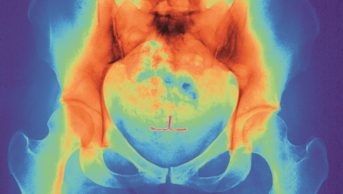
Burger/Phanie/REX
Summary
Combined oral contraceptives are contraindicated in patients who have migraines and smokers aged over 35 years.
‘Quick start’ regimens, in which regular contraception is started before the woman’s next ‘normal’ period, are available if the woman needs to start contraception immediately. These are also useful for women with irregular menstrual cycles, where such a wait is impractical. Quick start regimens are outside the product licences for hormonal contraception products.
Any woman with unscheduled vaginal bleeding needs to check whether she is pregnant, have a risk assessment or tests for sexually transmitted infections, and a vaginal examination, which should include a cervical smear to rule out cancer.
Most methods of contraception are safe and effective but some may have troublesome side effects. It is therefore important to have a woman’s preferences in mind when recommending a method of contraception, and inform her of the trade-offs of each option so that she can make a choice that is right for her and her circumstances.
This article will use theoretical case studies to illustrate common problems associated with contraception and treatment options to consider.
| UK MEC categories for contraceptive use | |
|---|---|
Category | Definition |
UK MEC 1 | A condition for which there is no restriction for the use of the contraceptive method. |
UK MEC 2 | A condition where the advantages of using the method generally outweigh the theoretical risk or proven risks. |
UK MEC 3 | A condition where the theoretical or proven risks usually outweigh the advantages of using the method. Provision of a method requires expert clinical judgement or referral to a specialist contraceptive provider, since the use of the method is not usually recommended unless other more appropriate methods are not available or are not acceptable. |
UK MEC 4 | A condition that represents an unacceptable health risk if the contraceptive method is used. |
Case study 1: smoker with headaches
Agnetha Perry is 36 years old and she has been taking Ovranette (ethinylestradiol 30µg and levonorgestrel 150µg; Pfizer) for six months. She has no personal or family history of heart disease or venous thromboembolism (VTE). She stopped smoking over a year ago, but has recently started to smoke again because of stress at work. She now smokes 20 cigarettes a day. She has noticed some bad headaches; sometimes she has to take time off work because of them. She is not sure what is causing her headaches. She has just seen the practice nurse at her GP surgery to get a repeat prescription. Her blood pressure at check-up was 120/67mmHg and her body mass index (BMI) was 27. Should she continue on Ovranette?
Ovranette is a combined oral contraceptive (COC). According to the UK Medical Eligibility Criteria (UK MEC), a history of non-migrainous headache is not a contraindication to starting or continuing with the COC[1]
. However, if she were to have migraine with aura, it may no longer be safe for her to continue as this is a UK MEC category 3 condition for COCs, where the theoretical or proven risks generally outweigh the advantages of using the method (See ‘Hormonal contraception: methods and patient eligibility’).
Agnetha has a
lso started smoking again. This would not be a problem if she were aged under 35 years, which would be UK MEC 2 for COCs. However, this has put her in UK MEC 4 for COCs, as it would increase her risk of cardiovascular d
isease.
Agnetha should be advised to speak to her GP or a specialist to discuss changing from a COC to an oestrogen-free method of contraception, all of which would be suitable for this patient.
Case study 2: regular EHC use
Bethany Chang is 19 years old and requests the ‘morning after pill’ from you. Your records show she has had two prescriptions for emergency hormonal contraception (EHC) dispensed in the past three months. She is not on regular contraception as she says she is too forgetful to take the pill and, since she is not with a regular partner, she does not feel she needs to go on a long-term method. What would you cover in your discussion?
There are three issues that might need to be covered: immediate need for emergency contraception; future contraception; and risk of sexually transmitted infections.
First, establish if Bethany is suitable for levonorgestrel, ulipristal acetate or copper intrauterine device for emergency contraception. If her last unprotected sexual intercourse was <72 hours ago and she has not had sex since her last normal menstrual period, she can be given levonorgestrel as emergency contraception. If she last had sex more than 72 hours but less than 120 hours ago, ulipristal acetate might be suitable. Copper intrauterine device is the only option if she had sex more than five days ago[2]
.
Bethany is at risk of sexually transmitted infections (STIs) as she is young, does not have a regular partner and may have unprotected sex. No method of contraception apart from condoms protects against STIs., and she may need a check-up at a sexual health clinic. In 2013, more than 1.7 million chlamydia tests were carried out in England among young people aged 15–24 years, with over 139,000 chlamydia diagnoses made[3]
. In addition, the intrauterine device is contraindicated in women with a current chlamydial or gonorrhoeal infection (UK MEC 4).
Bethany may wish to try long acting reversible contraceptives (LARCs) such as the progestogen-only injection, progestogen-only implant, and either of the intrauterine methods. If she chose the copper intrauterine device for emergency contraception, she could keep it in situ for regular contraception.
If Bethany does want to start regular contraception, she may be eligible for a ‘quick start’ regimen, in which regular contraception is started before the woman’s next ‘normal’ period. These are also useful for women with irregular menstrual cycles, where such a wait is impractical. Quick start regimens are outside the product licences for hormonal contraception products.
The UK Faculty of Sexual and Reproductive Healthcare has produced clinical guidance on quick start regimens[4]
. Most contraceptives (with the exception of the levonorgestrel intrauterine device), can be used in a quick start regimen[3]
.
These patients need to take extra contraceptive precautions; for seven days if using levonorgestrel EHC (two days if starting a progestogen-only pill), or 14 days if using ulipristal acetate (nine days if starting a progestogen-only pill). This longer period is required because ulipristal acetate is a progestogen antagonist, and in theory could reduce the efficacy of progestogen-containing contraceptives.
As pregnancy cannot be reasonably excluded when quick starting at the time of using EHC, healthcare professionals should ensure that the woman is:
- Likely to continue to be at risk of pregnancy or she has requested to start contraception immediately;
- Aware that EHC is not totally effective and she may be pregnant;
- Informed that there may be a theoretical risk to a foetus from exposure to contraceptive hormones, but evidence suggests no harm;
- Aware that a pregnancy test has to be taken no sooner than three weeks after last unprotected sexual intercourse to reliably exclude pregnancy and knows where to obtain test kits;
- Offered alternative forms of contraception (e.g. condoms);
- Invited to return if she has any concerns or problems with the contraception.
Case study 3: risk of venous thromboembolism
Caroline Pelton is 35 years old and has been using Marvelon (ethinylestradiol 30µg and desogestrel 150µg; MSD) for a few years. She was started on doxycycline for her acne by her GP and she is concerned about it interfering with her contraceptive. Caroline is also taking sodium valproate for epilepsy, and has not had a seizure for five years. She read online that Marvelon increases her risk of blood clots. She is now very concerned and wonders if she should change her contraception.
Marvelon contains desogestrel, a third-generation progestogen. Some newer generations of progestogens are associated with increased risk of VTE but the absolute risk is still small. The risk of VTE in women not using contraception and who are not pregnant is 2 per 10,000 healthy women a year (see ‘Risk of venous thromboembolism with combined hormonal contraceptives’); this rises to 5–7 per 10,000 for women who use combined hormonal contraception (CHC) containing levonorgestrel, and 9–12 per 10,000 in women who use CHC containing desogestrel[5]
.
Her absolute risk of VTE while taking Marvelon is still small. Her risk would increase further if she were to become pregnant, have surgery, have a period of immobilisation, malignancy and if she had inherited conditions (e.g. factor V Leiden mutation). Given the potential risks and benefits, she can be advised to continue with Marvelon.
| Risk of venous thromboembolism (VTE) with combined hormonal contraceptives | |
|---|---|
Risk of VTE per 10,000 healthy women per year | |
Not using combined hormonal contraceptive and not pregnant | 2 |
Taking combined hormonal contraceptive containing levonorgestrel, norgestimate or norethisterone | 5–7 |
Taking combined hormonal contraceptive containing etonogestrel (vaginal ring) or norelgestromin (contraceptive patch) | 6–12 |
Taking combined hormonal contraceptive containing gestodene, desogestrel or drospirenone | 9–12 |
There are some anticonvul
sants and antibiotics (e.g. rifampicin and rifabutin) that reduce the efficacy of CHCs, progestogen-only pills and contraceptive implants due to their effect as enzyme
inducers. Anticonvulsants that are strong enzyme inducers include carbamazepine, phenytoin and primidone; sodium valproate has no significant effects on the efficacy of CHC and Caroline does not need to change her treatment. Enzyme inducers are not known to effect depot medroxyprogesterone acetate or intrau
terine devices, but may affect the etonogestrel implant.
Doxycycline does not affect the efficacy of CHCs, and Caroline can continue her treatment as prescribed. Alternatively, the CHC co-cyprindiol (ethinylestradiol and cyproterone acetate) is licensed for the treatment of acne that has not responded to oral antibiotics. It is associated with higher VTE risk so patients should be switched to another contraceptive three to four months after the acne has resolved[6]
.
Case study 4: concern about irregular bleeding
Debbie Winger is a 33 year old woman who has been using the depot medroxyprogesterone acetate injection for contraception for almost a year. She is not happy with it because she thinks it is causing her a lot of irregular bleeding. She is a non-smoker with no personal or family history of VTE or cardiovascular disease. She had a repeat dose two months ago. At that time her blood pressure was 110/55mmHg and her weight had increased by 13kg since starting, making her BMI almost 30. She was prescribed a pack of Microgynon (levonorgestrel 150µg) to help with the irregular bleeding (to ‘add back’ oestrogen). She had no side effects with Microgynon and asks if it is possible to switch.
Unscheduled bleeding is not uncommon[7]
with progestogen-only contraception, including depot medroxyprogesterone acetate. Up to 70% of women using depot medroxyprogesterone acetate can become amenorrhoeic after one year. It is the only form of hormonal contraception associated with weight gain, but only in women under 18 years with a BMI >30[8]
.
Any woman with unscheduled vaginal bleeding needs to check whether she is pregnant, have a risk assessment or tests for STIs, and a vaginal examination, which should include a cervical smear to rule out cancer. A COC with 30–35µg of ethinylestradiol with levonogestrel or norethisterone enanthate may be used for up to three months continuously or in the usual cyclical regimen to regulate bleeding; this is an unlicensed indication[9]
.
Debbie does not have contraindications for use of a COC so she can discontinue her injections and continue using Microgynon; a BMI of 30–34 is a UK MEC category 2 for COCs. She does not need to take extra precautions when she stops her injections as she is covered by the COC.
Richard Ma is a GP principal in London, and NIHR In-Practice Fellow at Imperial College, London.
How to have effective consultations on contraception in pharmacy
What benefits do long-acting reversible contraceptives offer compared with other available methods?
Community pharmacists can use this summary of the available devices to address misconceptions & provide effective counselling.
Content supported by Bayer
References
[1] Faculty of Sexual and Reproductive Healthcare. UK Medical Eligibility Criteria for contraceptive use. London: Faculty of Sexual and Reproductive Healthcare 2009.
[2] Faculty of Sexual and Reproductive Healthcare. Faculty of Sexual and Reproductive Healthcare Clinical Guidance — emergency contraception. London: Faculty of Sexual and Reproductive Healthcare, 2012.
[3] Public Health England. Sexually transmitted infections. Annual data tables 2013. London: PHE 2013.
[4] Faculty of Sexual and Reproductive Healthcare. Faculty of Sexual and Reproductive Healthcare Clinical Guidance — quick starting contraception. London: Faculty of Sexual and Reproductive Healthcare; 2010.
[5] Faculty of Sexual and Reproductive Healthcare. Venous thromboembolism (VTE) and hormonal contraception. London: Faculty of Sexual and Reproductive Healthcare 2014.
[6] Faculty of Sexual and Reproductive Healthcare. Faculty of Sexual and Reproductive Healthcare Clinical Guidance — combined hormonal contraception. London: Faculty of Sexual and Reproductive Healthcare 2011.
[7] Kovacs G. Progestogen-only pills and bleeding disturbances. Hum Reprod 1996;11(Suppl 2):20–23.
[8] Faculty of Sexual and Reproductive Healthcare. Faculty of Sexual and Reproductive Healthcare Clinical Guidance — progestogen-only injectable contraception. London: Faculty of Sexual and Reproductive Healthcare 2015.
[9] Faculty of Sexual and Reproductive Healthcare. Management of unscheduled bleeding in women using hormonal contraception. London: Faculty of Sexual and Reproductive Healthcare, Royal College of Obstetricians and Gynaecologists 2009.

